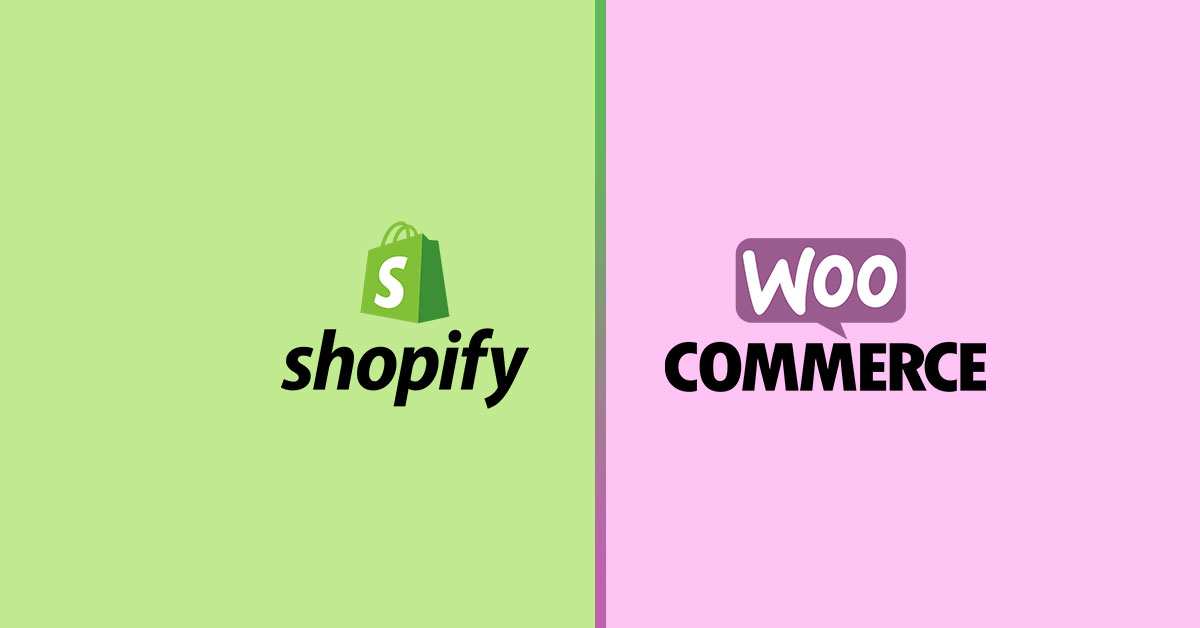WooCommerce vs Shopify: Which is the Best 2023 E-Commerce Platform for Your Business?
If you’re thinking of starting an online store, you’ll quickly realize that there are numerous e-commerce platforms to choose from. Two of the most popular options are WooCommerce and Shopify. Both platforms offer a range of features and tools to help you sell products online, but they differ in their target audiences and capabilities.

In this blog post, we’ll compare WooCommerce and Shopify to help you decide which platform is best for your online store. We’ll look at the key features of each platform, the pros and cons of using them, and which types of online stores they are most suitable for. By the end of this post, you should have a clear understanding of which platform is the best fit for your business needs.
WooCommerce vs Shopify: Which is the Best 2023 Platform for Your Online Store?
1. Overview of WooCommerce and Shopify

WooCommerce is an open-source e-commerce plugin for WordPress that allows you to add an online store to your existing WordPress website. It’s a popular choice for small businesses, bloggers, and anyone who already uses WordPress for their website. WooCommerce offers a range of features, including customizable product pages, payment gateway integration, and inventory management.

Shopify, on the other hand, is a standalone e-commerce platform that provides everything you need to create an online store from scratch. It’s a good option for businesses of all sizes, and it’s known for its ease of use and wide range of tools and features. Shopify offers customizable store templates, payment gateway integration, and marketing tools to help you sell your products.
One notable difference between WooCommerce and Shopify is that WooCommerce is a plugin that you install on your existing WordPress website, while Shopify is a standalone platform that you build your store on. This means that if you already have a WordPress website, it might be easier to set up an online store using WooCommerce. However, if you’re starting from scratch or don’t want to use WordPress, Shopify might be a better choice.
2. Comparison of key features
When comparing e-commerce platforms, it’s important to consider the features they offer and how they compare to one another. Here’s a breakdown of how WooCommerce and Shopify compare in terms of key features:
1. Cost
- WooCommerce: The basic plugin is free, but you’ll need to pay for hosting, a domain name, and any premium themes or extensions you want to use. Payment processing fees depend on the gateway you choose.
- Shopify: Prices start at $29 per month, which includes hosting, a domain name, and a range of features. Payment processing fees depend on your plan and the gateway you choose.
2. Ease of use
- WooCommerce: The setup process can be a bit more complicated than with Shopify, especially if you’re not familiar with WordPress. However, once it’s set up, it’s easy to customize your store and add products.
- Shopify: The setup process is straightforward and user-friendly. The platform has a clean interface, and it’s easy to add products and customize your store.
3. Marketing and SEO tools
- WooCommerce: It has a range of marketing and SEO tools, including the ability to create coupons, email marketing integration, and the option to add meta titles and descriptions to your products.
- Shopify: It has a wide range of marketing and SEO tools, including email marketing integration, social media integration, and the ability to create landing pages and abandoned cart recovery emails.
4. Customer support
- WooCommerce: It has a large community of users and developers who offer support through forums and documentation. It also offers email support for premium extensions.
- Shopify: It has excellent customer support, with 24/7 phone, email, and live chat support, as well as a large knowledge base and video tutorials.
5. Integration with other applications:
- WooCommerce: It has a large selection of third-party plugins and integrations that allow you to add functionality to your store, such as accounting integration and shipping label printing.
- Shopify: It has a wide range of third-party integrations and apps, including accounting, shipping, and marketing tools.
As you can see, both WooCommerce and Shopify offer a range of features, but they differ in terms of cost, ease of use, marketing and SEO tools, customer support, and integration with other applications. It’s important to consider which features are most important to you and your business when deciding which platform to use.
3. Pros and cons of WooCommerce and Shopify
When comparing e-commerce platforms, it’s important to consider not just the features they offer, but also their pros and cons. Here’s a breakdown of the main pros and cons of WooCommerce and Shopify:
1. Pros of WooCommerce
- It’s free to use, although you’ll need to pay for hosting, a domain name, and any premium themes or extensions you want to use.
- It’s highly customizable, allowing you to design your store exactly how you want it.
- It integrates with WordPress, which is a popular and user-friendly content management system.
- It has a large community of users and developers, which means you can find support and resources easily.
2. Cons of WooCommerce
- It requires more technical knowledge to set up and customize than Shopify.
- It may not be as user-friendly as Shopify, especially if you’re not familiar with WordPress.
- It may not be as scalable as Shopify, especially if you’re using shared hosting.
3. Pros of Shopify
- It’s easy to use and set up, with a user-friendly interface and a range of customizable templates.
- It has a wide range of features, including marketing and SEO tools, payment gateway integration, and customer support.
- It’s scalable, with plans that cater to small and large businesses.
- It has excellent customer support, with 24/7 phone, email, and live chat support.
4. Cons of Shopify
- It’s not free to use, with prices starting at $29 per month.
- It’s not as customizable as WooCommerce, although you can still design your store to a certain extent.
- It doesn’t integrate with WordPress, so you’ll need to build your store from scratch.
As you can see, both WooCommerce and Shopify have their own set of pros and cons, and the best choice for you will depend on your business needs and preferences. Consider factors such as cost, ease of use, scalability, and flexibility when deciding which platform is right for you. You should also consider security, as both platforms offer secure hosting and payment processing options, but you may want to do your own research to ensure that the platform you choose meets your security needs.
4. Who is each platform best suited for?
Based on the comparison of features and pros and cons, it’s clear that both WooCommerce and Shopify are suitable for a range of online stores. However, some types of stores may be better suited to one platform or the other. Here’s a breakdown of which platform is best suited for different types of online stores:
- Small businesses: Both WooCommerce and Shopify are suitable for small businesses, but Shopify might be a better choice if you’re looking for an easy-to-use platform with a range of features and excellent customer support. WooCommerce is a good option if you’re comfortable with WordPress and want a highly customizable platform.
- Large enterprises: Both WooCommerce and Shopify can accommodate large enterprises, but Shopify might be a better choice due to its scalability and range of features. WooCommerce may require more technical knowledge and customization to meet the needs of a large enterprise.
- Bloggers and content creators: If you already have a WordPress website and want to add an online store, WooCommerce is a good choice. It integrates seamlessly with WordPress and allows you to sell products from your existing website. However, if you’re starting from scratch or don’t want to use WordPress, Shopify is a good option as it’s easy to use and has a range of features.
- E-commerce beginners: If you’re new to e-commerce and looking for a platform that’s easy to use and has a range of features, Shopify is a good choice. WooCommerce might be a bit more technical and require more customization, so it might be more suitable for those with some e-commerce experience.
Ultimately, the best platform for your online store will depend on your business needs and preferences. Consider factors such as cost, ease of use, scalability, and flexibility when deciding which platform is right for you. Both WooCommerce and Shopify have their own unique strengths, so it’s worth taking the time to carefully consider which one is the best fit for your business.
Click here for 10 easy ways to optimize your website and increase your ecommerce sales in 2023
In this blog post, we’ve compared WooCommerce and Shopify to help you decide which platform is the best fit for your online store. We’ve looked at the key features of each platform, the pros and cons of using them, and which types of online stores they are most suitable for.
>>> Click Here to Start a free trial and enjoy 3 months of Shopify for only $1/month
Overall, both WooCommerce and Shopify are excellent e-commerce platforms that offer a range of features and tools to help you sell products online. WooCommerce is a good choice if you’re comfortable with WordPress and want a highly customizable platform, while Shopify is a good choice if you’re looking for an easy-to-use platform with a range of features and excellent customer support.
When deciding which platform to use, it’s important to consider your business needs and preferences. Factors such as cost, ease of use, scalability, and flexibility should be taken into account. Ultimately, the best platform for your online store will depend on your specific needs and goals.
We hope this comparison has helped you decide which platform is right for you. If you’re still unsure, it’s worth trying out both platforms to see which one works best for your business.







